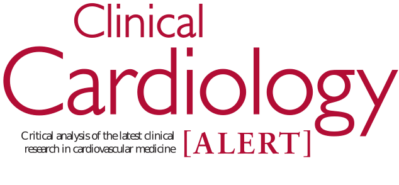
Clinical Cardiology Alert – January 1, 2006
January 1, 2006
View Issues
-
Pharmacology Watch
FDA Recommends Approval of Muraglitazar, But May Need To Reconsider; Which Antipsychotics Are More Dangerous?; Should CPOE Undergo Evaluation?; New Treatment for Tennis Elbow; FDA Actions -
Beta-Blockers for Heart Failure
Given the impressive results of beta-blockers added to angiotensin-converting-enzyme (ACE) inhibitors in heart failure patients, many have suggested that had beta-blockers been studied first for heart failure, they would have been so impressive that we would start them before ACE inhibitors. -
Beta-Blockers for Hypertension
For the past 3 decades, beta-blockers have been first-line therapy for hypertension. However, recently the efficacy of beta-blockers for treating primary hypertension has been challenged. Thus, Lindholm and colleagues from Sweden conducted a meta-analysis of 13 randomized, controlled trials for the treatment of primary hypertension where a beta-blocker was used in at least 50% of the patients. -
Beta-Blockers for Acute Myocardial Infarction
The emergency treatment of patients with acute myocardial infarction (MI) with intravenous then oral beta-blockers has become the standard of care based upon randomized trials of over 27,000 patients. However, most of these trials were done before the advent of reperfusion therapy and aggressive platelet antagonists. -
Risk of Myocardial Ischemia in ICD Patients
Ischemia during stress echocardiography is an independent predictor of death and ICD therapy in patients with coronary heart disease at high risk of arrhythmic death. -
Role of Adrenaline and Procainamide Infusion in the Evaluation of Unexplained Cardiac Arrest
Provocative testing with adrenaline and procainamide infusions is useful in unmasking the etiology of apparent unexplained cardiac arrest. -
Metabolic Syndrome: A Warning of Cardiovascular Disease and Type 2 Diabetes Mellitus?
Metabolic syndrome is common and is associated with an increased risk for CVD and T2DM in both sexes.
